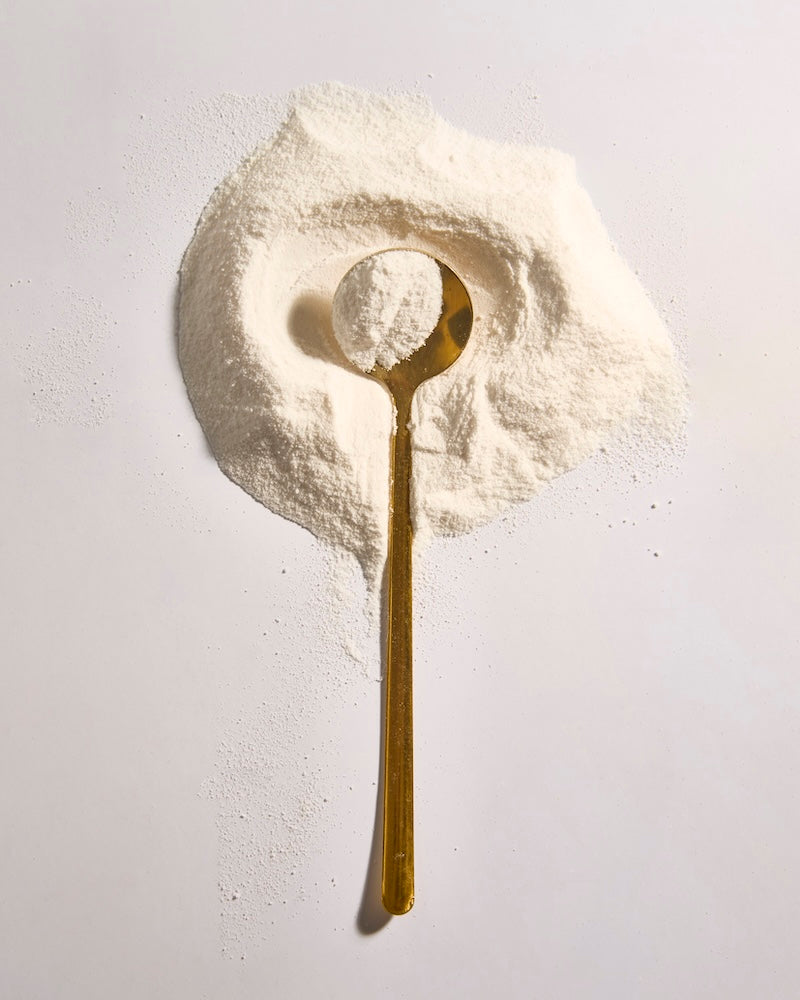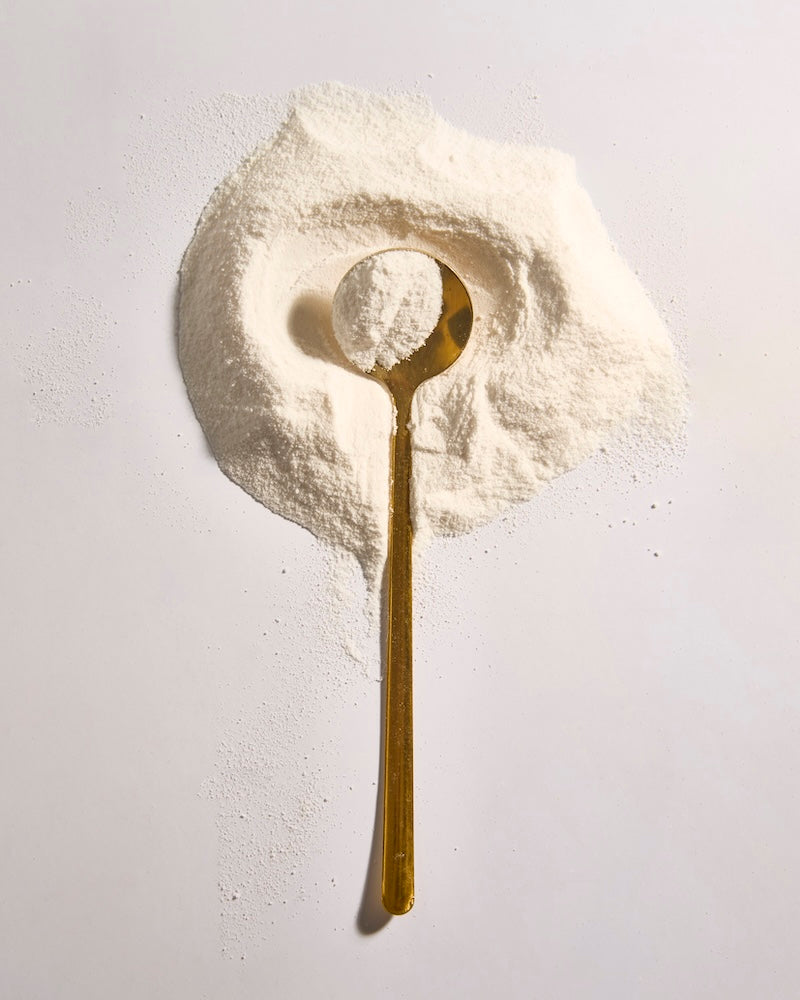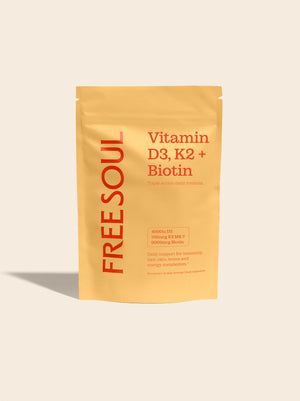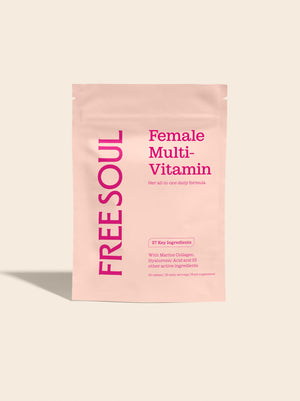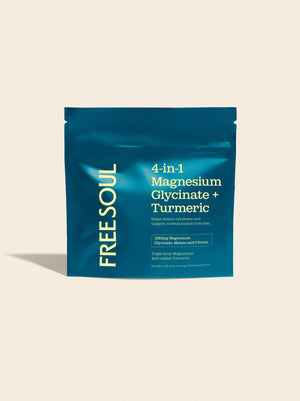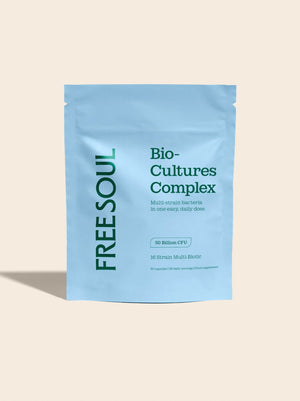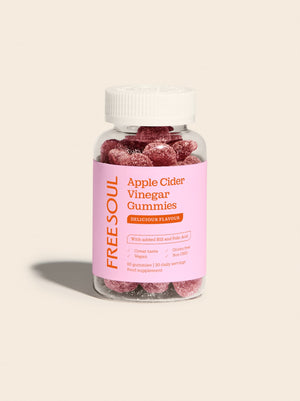Creatine is an organic compound that plays an important role in your body’s energy production system. If you’ve assumed up until now that it’s only for bodybuilders chasing serious muscle gain, you’re not alone. This is a very common misconception, but in reality, it offers many benefits for any type of body.
But what is Creatine? Your body produces some Creatine naturally, and you can also get small amounts from foods, like red meat, fish, and poultry. However, supplementation can be helpful to increase your stores more effectively.
Creatine is one of the most researched supplements available, shown to support muscles, energy, and cognitive function. And just to dispel a few common myths – it won’t make you gain weight, bloat, or mess with your hormones. With the help of Natalie Rouse, Registered Nutritionist and Head of Nutrition at Free Soul, we’re giving you the facts on Creatine, how it works, and why it’s good for you.
“Creatine can benefit people with many different lifestyles. It’s not just for those who hit the gym every morning, it’s something anyone, including women, can take to support strength and everyday energy,” says Natalie.
So… how does Creatine work?
In case you’re not acquainted, we’ll first introduce you to ATP (that’s adenosine triphosphate), your body’s main energy currency. It’s the source your body reaches for when it needs energy fast, like during a strength training set, sprints in spin class, or even a quick dash up the stairs.
So, what does Creatine do? “It’s stored in your muscles as phosphocreatine, which helps your body to regenerate ATP faster,” Natalie explains. “Your ATP levels can be depleted quickly during exercise. Have you ever hit a wall mid-workout? Taking Creatine supplements can make sure you have enough energy to push through in those moments. Over time, it’s also been shown to support performance, endurance, and recovery”.
What are the benefits of taking Creatine?
Creatine isn’t just about the muscle gains, let’s look at the other benefits this molecule can bring:
Feel stronger
You don’t have to be lifting heavy weights to feel the benefits of Creatine in your muscles. By helping your body produce more ATP, your muscles have access to quick, usable energy when they need it most. Whether you’re on your morning run or just powering through the end of a busy day, Creatine can help you feel more physically resilient.
Sharpen your focus
Your brain needs ATP too, particularly for tasks involving focus, decision making, and memory. When you’re under pressure or running on empty, Creatine can help improve energy supply in the brain. As Natalie puts it, “If you’re feeling a bit of mental overload, taking Creatine can help support your brain’s energy needs so you feel more switched on.”
Support your mood
Research also suggests that taking Creatine may play a role in mood support. “Creatine’s involvement in brain energy metabolism may help regulate your neurotransmitter systems, such as serotonin and dopamine,” says Natalie. “Some studies also link it to reduced cortisol levels – the “stress hormone” – during exercise. As a result, it may help you feel a little more steady and balanced, even on demanding days”.
Stay energised
Because Creatine supports energy production at a cellular level, it may help you feel less physically and mentally fatigued. We don’t just mean when you reach the end of a kickboxing class at the gym. If you’ve had a bad night’s sleep or you’re facing a mid-afternoon slump, Creatine may help you feel more consistent energy throughout the day.
When is the best time to take Creatine?
Research into the best time to take Creatine is still evolving, and so far there is no clear consensus. While some studies suggest that taking Creatine close to your workout time brings the best results, they differ as to whether pre or post exercise is best. Natalie says, “Overall, timing is less important than consistency. Taking around 3-5g of Creatine a day will safely build up your stores over time, so your body has the fuel it needs when it counts”.
Why are more women using Creatine?
For a long time, Creatine was seen as a “gym bro” supplement, and women were understandably put off from trying it. Add to this a host of other misconceptions floating around, including the myth that Creatine is calorific and makes you gain weight, or that it interferes with your hormones, and it’s no wonder many gave it a wide berth.
But that’s changing. As the science becomes clearer, so does the understanding that Creatine isn’t just for bulking. Here are some of the reasons more women are taking Creatine, which apply just as much outside of the gym as in it:
- Supports everyday energy – Whether you’re training or just managing a busy life, creatine can help you stay energised.
- Backed by science – Evolving research has explored its benefits specifically for women, including during the menstrual cycle and perimenopause.
- Strength you can feel – Just as useful for lifting heavy shopping bags as for resistance training, Creatine helps build and maintain muscle mass
- Contributes to cognitive function – Creatine plays a role in brain energy metabolism, supporting memory, processing speed, and focus
- Mood support – Neurotransmitters also need Creatine to function normally, helping your emotions stay balanced.
Want to know more? Check out our blog “What Does Creatine Do for Women?” for the full story.
Is creatine safe and should I start taking it?
The short answer is yes. Here’s why Creatine is considered a safe and effective supplement:
✅ It’s one of the most researched supplements available
✅ Approved by EFSA for energy and performance benefits
✅ Safe for long-term use in healthy adults
✅ Supports strength, energy, endurance, and mental clarity
✅ Safe and well-tolerated by healthy adults
With so many evidence-backed benefits and a strong safety profile, it’s an easy, low-risk way to support your overall wellbeing.
Creatine FAQs
Can I take creatine without working out?
Yes, you can. While creatine is well known for supporting exercise performance, its benefits don’t end in the gym. Creatine can support you in feeling stronger and more energised in daily life. No dumbbells required.
Is there a downside to taking creatine?
Creatine is generally well tolerated. Some people experience a slight increase in weight due to water retention within the muscles, but this doesn’t cause visible bloating nor increased fat mass. There are no known serious side effects for healthy individuals when taken at the recommended dose.
How long does it take for creatine to work?
You may start noticing benefits like improved energy or workout performance within 2–4 weeks. That said, results vary depending on your activity level and lifestyle.
Is it good to take creatine every day?
Yes, in fact, consistency is recommended. A daily dose of 3–5g helps maintain Creatine stores in your body, so you’re topped up and ready when your body needs quick energy.
Is creatine worth it for beginners?
Absolutely. Creatine is not only for seasoned gym-goers. Whether you’re just getting started or looking to feel more energised day-to-day, creatine can offer valuable support at any stage of your journey.
Who should avoid creatine?
Creatine is considered safe for most people, but may not be suitable if you have certain kidney conditions or are on some medications. If you have any existing health concerns, or if you're pregnant or breastfeeding, it’s always best to check with your GP or a healthcare professional before you begin taking a new supplement.
Want to learn more?
- Beginners Guide to Creatine: When to take it, How to use it, and Why it matters
- Why Creatine Belongs in Your Self-Care Stack
- 6 Creatine Myths: What You’ve Heard vs. What’s Actually True
- Not Just for Muscle: How Creatine Supports Hormonal Health
- What does creatine do for women? Benefits beyond the gym
